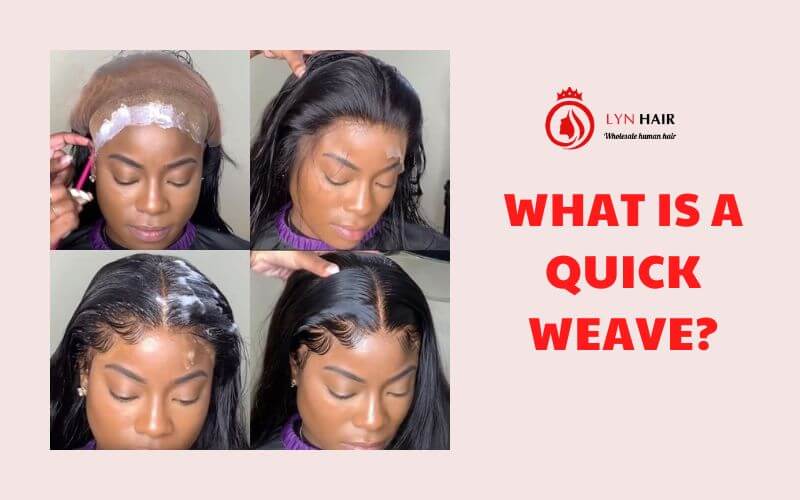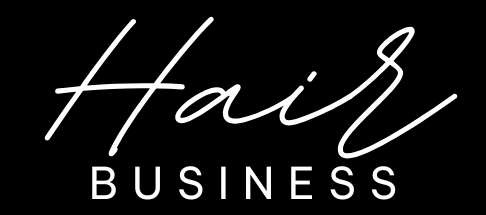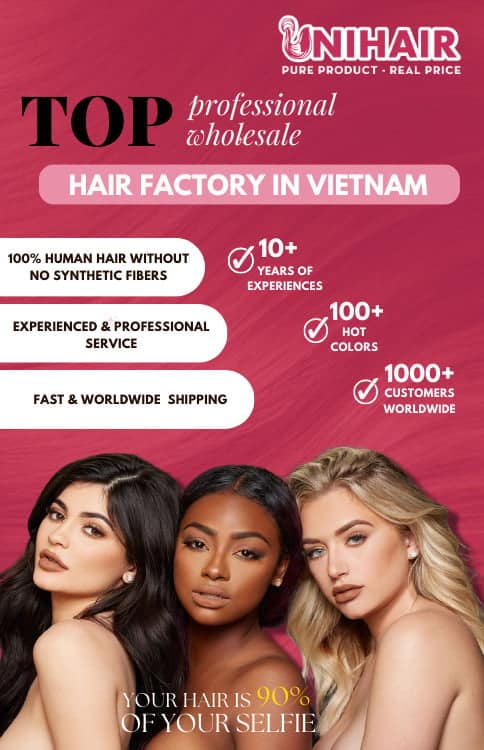If you’re thinking about changing up your hairstyle, a quick weave may be worth considering. This popular hair extension technique is a great way to achieve a new look without committing to a long-term style. But wait, did you know: What is a Quick Weave? How To Do A Quick Weave? How long does a quick weave last?
Keep reading to learn everything about quick weave!
What is a Quick Weave?

A Quick Weave is a hairstyle technique where extensions are glued onto a protective cap or a person’s natural hair to create a new hairstyle. The process involves applying a protective cap to the head, cutting and shaping hair extensions to fit the desired style, and then gluing them onto the cap or natural hair. The result is a quick and easy way to change your hairstyle without the commitment of a sew-in weave or braids. Quick Weaves are popular among people who want to try out different hairstyles without the time or expense of a full weave.
>> SEE MORE: Quick Weave Styles With Curly Hair to Embrace Your Natural Beauty
Pros and cons of Wearing a Quick Weave

Here are some pros and cons of wearing a quick weave:
-
Pros:
There are countless advantages in deciding to wear quick weaves that make them so appealing. However, here are 4 main reasons make it become the most popular install weave hair method:
Quick and easy: A quick weave is a fast and easy way to add length, volume, and texture to your hair. It can be done in a matter of hours and requires minimal maintenance.
Versatile: A quick weave can be styled in a variety of ways, including straight, curly, or wavy. You can also add highlights or lowlights to create a unique look.
Protects natural hair: A quick weave can be used as a protective style to help prevent damage to your natural hair. It can also be used to give your hair a break from heat styling.
Affordable: A quick weave is typically less expensive than other types of hair extensions, such as sew-in weaves or tape-ins.
-
Cons:
Quick weave also faces many criticisms. This hair installation process has a bad reputation for causing a number of undesirable results. Of course, like other install methods, the results are bad as far as human actions and errors are concerned.
Here are four potential downsides of wearing a quick weave to consider.
Potential damage to natural hair: If not installed properly, a quick weave can cause damage to your natural hair, including hair breakage, hair thinning, and scalp irritation.
Limited lifespan: A quick weave typically lasts for 4-6 weeks, after which it needs to be removed and reinstalled. This can be time-consuming and expensive in the long run.
Limited styling options: While a quick weave is versatile, it may not be as customizable as other types of hair extensions. For example, you may not be able to wear your hair in a high ponytail or bun.
Requires regular maintenance: A quick weave requires regular maintenance to keep it looking fresh and to prevent damage to your natural hair. This includes regular washing, conditioning, and styling.
>> RELATED POST: Half Up Half Down Hairstyles Weave
How To Do A Quick Weave?
[wpcc-iframe loading=”lazy” title=”Versatile Quick Weave Tutorial| Sleek Middle Part On Natural Hair! New Technique! ft. Ishow Hair” width=”1020″ height=”574″ src=”https://www.youtube.com/embed/Rhzm45FEmDc?feature=oembed” frameborder=”0″ allow=”accelerometer; autoplay; clipboard-write; encrypted-media; gyroscope; picture-in-picture; web-share” allowfullscreen=””]If you’re interested in doing a quick weave, here are the basic steps to follow:
- Start by washing and conditioning your hair thoroughly. Then, blow-dry your hair completely.
- Braid your hair tightly into cornrows. The cornrows should be neat and close to your scalp. The number of cornrows you need will depend on how much hair you want to leave out.
- Put a wig cap on your head, making sure it covers your cornrows completely.
- Take the hair extensions and cut them to the desired length. Then place them on a flat surface.
- Apply weave bonding glue to the weft of the first hair extension. Then, place the extension onto the wig cap, starting from the back of your head. Press down on the weft to ensure it’s secure.
- Repeat the process with the remaining extensions, working your way up to the front of your head. Make sure you leave out enough hair to cover the weave.
- Once all the extensions are glued in place, style your hair as desired.
- Finally, let the glue dry completely. This should take about 15-20 minutes.
- When the glue is dry, cut off any excess lace or wig cap from around your hairline.
And there you have it! A quick weave is a great way to switch up your hairstyle without committing to a long-term weave or wig. Just make sure to take care of your hair and extensions properly to prevent damage.
How long does a quick weave last?

While a quick weave can be a great way to achieve a new look quickly, it’s important to note that it may not last as long as other hair extension methods. If you’re looking for a longer-lasting hairstyle, you may want to explore other options. A quick weave typically lasts for about 4 to 6 weeks, depending on how well it is maintained and the quality of the hair used. It is important to take good care of your quick weave during this time to ensure that it lasts as long as possible. This includes regularly washing and conditioning the hair, avoiding excessive heat styling, and being gentle when brushing or combing the hair.
Are quick weave better than sew-ins?

There is no definitive answer to whether quick weaves are better than sew-ins, as both have their advantages and disadvantages depending on individual preferences and needs.
Quick weaves are generally faster to install and can be more affordable than sew-ins since they require fewer materials and less time in the salon. They also offer more versatility in terms of hairstyles and allow for more creative styling options, such as adding hair extensions or experimenting with different hair colors.
On the other hand, sew-ins involve braiding the natural hair and then sewing the hair extensions onto the braids, which can be more time-consuming and expensive but also offer a more secure and long-lasting result. Sew-ins can also protect the natural hair from heat damage and breakage since it is typically styled in a protective style, such as braids or twists.
The choice between quick weaves and sew-ins depends on your individual preferences, budget, and hair care needs. It’s always important to consult with a licensed stylist and take proper care of your hair extensions to ensure they last as long as possible and maintain healthy natural hair.
FAQs:
Do quick weaves damage your hair?
Quick weaves can damage your hair if not installed or removed properly. Improper use of bonding glue or sew-in methods can lead to hair breakage or loss.
How do you keep a quick weave?
- Here are some tips to help keep a quick weave in good condition: Avoid using oil-based products on your weave.
- Use mild sulfate-free shampoos and conditioners when washing your hair.
- Protect your weave at night with a satin scarf or pillowcase.
- Use low heat when styling, and avoid excessive heat.
- Avoid swimming or getting your hair wet when it rains.
What is the average price for a quick weave?
The average price for a quick weave can vary depending on factors such as location, the experience of the stylist, the type of hair extensions used, and the complexity of the style. In the United States, the average cost for a quick weave is typically between $50 to $150.
What is the easiest weave to maintain?
The straight or bone straight weave is the easiest weave to maintain. These hairstyles are less prone to breakage, easy to style and require little care, very suitable for busy women.

